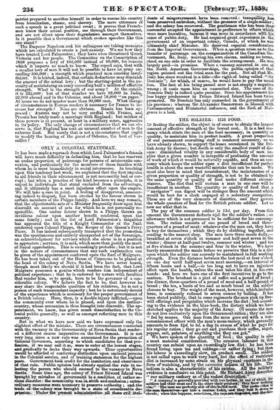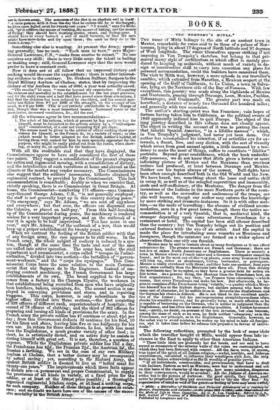THE SOLDIER.: . HIS FOOD.
br feeding the soldier, the object is of course to obtain the largest amount of effective stiangthat the lowest cost. It is abed eCO- nomy. which stints the man of.the food necessary, in. quantity or quality, to maintain hits in perfect health. A great proportion of our permanent recruiting staff is rendered necessary, as we . have already shown, to support the losses occasioned in the Bri- ,tish. Army by disease ; but death is only the smallest result of dis- ease : diminished vitality in any considerable body of' men urn- plies that a given number is incapable of producing the amount of work of which it would be naturally capable, and thus an eco- ; /lamp which keeps-She soldier upon a diet insufficient for perfect ;health is about the most wasteful mistake that can be made. We .must also bear in mind that nourishment, the maintenance of a given proportion or quality of strength, is not to be obtained by the same quantity or quality of food under different circum- stances. The diet that will sustain a man in one case will be insufficient in another. The quantity or q_uality of feed that a "navigator" can digest will be stronger thee theatmount which
would be best for a clerk engaged at a sedentary occupation. These are of the very_elements of dietetics, and they govern the whole question of food for the British private soldier. Let us now see . what that is.
The pay of- the common soldier is 13d. per day. From this amount the Government deducts 4,-Id; for the soldier's ration ; an allowance which is uotpresumed to be sufficient for his consump- 'tithe The ration consists of one pound of bread and three- quarters of a pound of meat: whatever else the men eat, they have to buy for themselves' which they do by clubbing together, and sending to the nearest shop. The men have three meals :breakfast at sevenn o'clock in summer and half-past seven in the. • winter; dinner at half-past twelve, simmer and winter; • and tea . at five o'clock in the summer .and four in the winter. We have barely enumerated the meals before we perceive that this is a diet . upon which the soldier can scarcely be maintained in full working strength. Even the distance between the last meal at four o'clock on one day until' half-past seven next morning—an interval of :fifteen hours and- a half,—is too icing not to have an injurious 'effect. upon the health, unless the man takes his diet in his own hands: and here we have one of the first incentives to go to the canteen. The breakast is a pint of coffee and a pound of bread ; the dinner, three-quarters of a pound of meat and a half-pouncl of broad; the tea, a ibasin of tea and as much bread as the soldier chooses to buy. The weight of the meat,. however, which includes bone' is commonly reduced to seven ounces by boning. It has been stated publicly, that in some regiments the men pick up free- will offerings and perquisites which increase the diet ; but accord- ing to the evidence in the blue-book, the dietary which we have sketched applies to the majority of the Army. Of course the men do not live exclusively upon the Government rations they are also " fed by messes. One man from the mess goes out with a non- commissioned officer with the men's mess-money, which generally. amounts to from 21d. to 3d. a day in excess of what he pays for his regular ration ; they go out and purchase their coffee, sugar, peppr, salt, potatoes, or anything else they can get."
e have spoken of the quantity, of food ; the quality is also
a most material consideration. The common labourer in this country can subsist upon an exceedingly low diet; he has been found living, upon tea and cabbage—or rather dying; but then, his labour lit exceedingly slow, its product small. The soldier is not called upon to work very hard, but the effect of restricted diet is increased, by some strata on his physical exertions in the ,ferns ot watching, and by the excessive_ tedium of his life. The tedium is also a characteristic of his cuisine. All the military ;evidence is conclusive on this point. Sir Richard Ahoy aescribes " our military. cookery as of the rudest description." "A company as generallyporided with two boilers in one of which the soldiers boil their meat and m the other their potatoes'i they have nothiht else." The men are perfectly sick of this boiled meat. The cooks—that is the man themselves—get into a routine r anti they boil it dowir shreds ; when this happens, sometimegatneemespee distrusted, and Use din- ectis thrown away. The samerresoof the diet-is an absolute evil in itself : " a:mina goes en with it from the day that he enlists till he is discharged ; htlived.upon bailed meat for:twenty-caie years." "I would," sayssEir Rich- ard, ,o.give soldiers the means ef roasting,the means of baking apd the means of lVventr they should have rpast4ng7grates, ovens, and jryinglans. 1. ationld have in every barrack a sort of small batterle,:' that the Men raighthave otew-lieles andifry' tipoff'thent; the saMoJas"thty do in the PrencliAmay." • . i J:L • Something else .0.160- is wanting. • At p itti1the Amy, ing.generally; has no 'cook. l'Each Men Or- General-Lawrence, C.B., " eooks- from sunrise tei stiniteti No.ene acquires any- skill ; there is verylittle scope few: talent iii,holing or making eoup ; still,. General-Lawrence &Lye- that the nien*ould
prefer to have a constant ttooki • •
:Now it does not at air feline that an improved dititary. and cooking wonld increasothe:expenditure ; there is ratherinterest- ing evidence to the contrary. Dr. Graham Balfour; Surgeento the Royal Military Asylum -ateheliea; states; thatiby improving the dietary-of -the Asylum the.atim -43001, As attar Was aettiatly saved: The result..V? 'he says, 441itere 'far beyond m'Y erpeetatiore. Competirtet the sickness and:mortality in the establishment : for the ten year previous,: and for the eight years and a half that have passed since these alterations, I find that the sickness has been reduced by one-third,,, and the annual ,raor- trtlity has fallen from 91 per 1000 of fhe strength- On the averag.e Of ten' years, to -4-9'. per.1000. This -is not entirely' attribiahle to the change vf - diet, thdrigh= thatvreas ' most imptirtant: Meant: I ndreaseft, Spire:0;in the. dormiteries, increased ventilators, &c., did the rest."
All the witnesses agree in-two recommendations-
1. The whole of. liWrirtithiri,: which' at -present lid has partly to bay for hiniself,,nmat be,forelied to _the:private soldier by a " well-organ,. lied" connalseariat, at 'a cost not exceeding 8y. per diem. 2. The means musile giVen' to the soldier of either cooking these Pro'' visions for himself; -as the FreliCh; dc, hie variety Of Ways • of else- (which -would be better ridaptecleto..the. British soldier's:114kt) of; having:Ahem -well cooked for him by men speaially. aweinted fer: the purpose, nlio might be easily picked out from the ranks, when show- ing, as many do an aptitude for the business.' . With all the creditable ie,pl that they have displayed, the CommisSioners' appear to have considered the first of these two points. They suggest a ciansoliclation of the Present stoppage for ration and regunental messing„iiith a conSelidation of dietaiy,. and the introduction of Bach variations at home and abroad as the climate or the market may render necessary. The Commissioners also suggest that the soldiers' necessaries, hitherto obtained by regimental contract, be provided by the Commissariat. This last' recommendation is remarkable ; doubly so-when we Consider that, strictly speaking, there is no Commissariat in Great Britain.: At home the Coninussiiriat-Limanbeirirtg offieers—sayaconimis- sary2General George Adonis,' .C.B., "is Mit generally.eraployed ; the staff is not generally kept up in this country daring peace." "On emergency," says Mr. Adam* "we are sent. eff anywhere and everywhere; but that- err, the officers are 'dispersed over the Colonies, or placed on half-pay." From this half-breaking up of the Comnimsariatduring peace; the machinery isrendered useless for a very important purpose, and on the outbreak of a war it is again to be half improvised. "Von lese more . in one year," says Mi. Adams;. "at the outbreak Of a War, than would keep up a prciper establishment for trienty years." When we contrast the feeding of the British soldier with that of any foreign arty, the case appears to he still worse. In the French arbay, the Whole subject of cookery is reduced to a sys- tem, non& at the same time the taste and zest of the men are called into active operation. The army has, Under the eFiril department and commissariat, a corps called "'troupes de l'admi- mstration," divided into two sections—the battalion of "govern- nient-workmen,'" and the "corps' des equipages.' This c:ont-: raissariat Corps hears the same relation to the main. Commis- sariat that our Sappers do to the Engineers. Instead of em- ploying contract .machiuery, the French Government „ heti large establishments of its own. The bread supplied to. the troops comes from a factory; in the Champs ElysEes, the 'Workmen in that establishment' being recruited from men who have-orig-inallY, been butchers, bakers, carpenters, &c. The sward section As Ma, ployed in conveying nrovisione. and stores, and in repairing. waggons. This corps, heytever, is only subordinate to the higher office; divided itite- three sections,—the first consisting of 328 officers of different rank, superintendent's of hospitals; the second of 78 officers of clething.; and the third of .362 offieers for preparing and issuing all Wade Of provisions.fer the army. In the French army the private soldier has 47 centimes or. about 4.1d, per day ; from this Government deducts 32 eentinies for his food, 10 for his linen and shoes, leaving five or one halfpenny for his own use: In return for these deductions, he has, with less meat than the Englishman, a much greater variety of other food ; in short, he is artistically dieted,, and on active duty he assists in- dicting himself with great art. It is net, therefore a question of expense, While the Englishman private soldier lies 13d a day, the Frenchman has 1-4.1d., the PriMsian 2,1d., the Austrian 2d., the Russian a farthing. We see in. the :case of our own Military Asylum at Chelsea, that a 'better' dietary may be accompanied by actual saving ; yet, according' to Sr Richard Airey, the opulent British soldier is doomed-to 'live on "-boiled Meat for twenty-one years." The improvements which these faet.S appear to dictate are—a. permanent and proper Comthisiariat, to supply the provisions of all kinds in variety, at a flied price for the soldier, or at least at the lowest price possible ; a thoroughly organized regiMental kitchen: corps, or at least a cooking corps„ for each company. Neither of these things is at present in exist- ence; and rtadonbt we.har• here one of the causes of the exoes-
siVe mortality' in the British Army.- • • • •



























 Previous page
Previous page